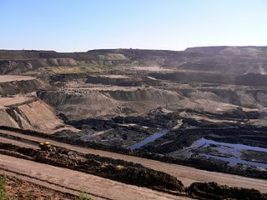By Tony Royden
The Canadian government loaned more than $1 billion in loans to a mining company that used a complex offshore business structure to allegedly avoid nearly $700 million dollars in Canadian tax,theeyeofmedia.com has heard.
Turquoise Hill Resources- a Canadian company based in Vancouver and listed on the Toronto and New York stock exchanges- received a $750 million (U.S.) loan in 2015 from Export Development Canada (EDC)- a crown corporation that supports Canadian businesses abroad.
The loan was in excess of $1 billion Canadian, according to EDC’s disclosure database. Turquoise Hill Resources is a Canadian company founded by Robert Friedland, an American-born Canadian citizen now living in Singapore, who spent years developing the stake before partnering with British-Australian mining giant Rio Tinto in 2006.
Turquoise Hill ran the finances for its massive Oyu Tolgoi mine in Mongolia for six years through shell companies in Netherlands and Luxembourg, the report reveals. This occurred between 2010 and 2016, allowing it to avoid paying $559 million (U.S.) in Canadian corporate income tax, worth $694 million Canadian at current exchange rates, according to a report put out by the Dutch NGO SOMO this week.

Image of Karyn Keenan, Director AboveGround (source http://aboveground.ngo/about-us/staff/)
“There does seem to be a contradiction there,” said Karyn Keenan, director of Above Ground, an Ottawa-based NGO that advocates for corporate accountability.
“Should EDC be providing over a billion dollars of financing to a company that’s engaging in tax avoidance?” she asked. “EDC is a public institution. It’s an arm of the state. It should operate in a way that’s coherent with the policies and the stated aims of the government.”
“If the government of Canada is trying to impose a progressive tax regime to sustain the social contract with Canadians, then it’s surprising this kind of deal could happen,” Keenan said.
EXPANSION
The loan was Canada’s portion of a $4.4 billion (U.S.) finance deal to expand the Oyu Tolgoi’s open pit with a second underground mine. The other sources of funds are EDC’s American and Australian counterparts and 15 commercial banks, including CIBC and HSBC.
EDC spokesperson, Phil Taylor insisted the corporation pays due diligence is performed on all deals to make sure they comply with Canadian laws. He told the eyeofmedia.com in a statement:
“We believe that the CRA is the ultimate authority on the appropriateness of Canadian corporate tax structures, and their specific approval in this case constitutes the final word on the matter from EDC’s perspective,” Taylor said.
Turquoise Hill has challenged the credibility of the SOMO report, saying that the company had received approval from the Canada Revenue Agency for its tax structure.
“Turquoise Hill and Oyu Tolgoi are committed to tax transparency and Turquoise Hill believes that our tax practices are … compliant with local laws, international standards and voluntary commitments,” wrote company spokesperson Tony Shaffer in an email.
“We believe a significant number of the statements presented as alleged facts in the SOMO report are inaccurate or unsubstantiated,” he said.
FINANCIAL DECLARATIONS
The report, based on public financial declarations, shows that Turquoise Hill declared $2.1 billion in profit in Luxembourg, where it only employs one part-time staff member. The company paid $89 million in tax in Luxembourg — a tax rate of 4.2 percent.
However, It paid no corporate income tax in Canada, the report states.
Export Development Canada is a self-financing crown corporation that supports Canadian businesses operating abroad with insurance and loans. The Corporation is committed to the development of Canada’s export trade.
Our rigorous due diligence requirements ensure that all projects and transactions we support are financially, environmentally and socially responsible.”
EDC has signed on to multiple international guidelines and standards for ethical business conduct, including the OECD’s Guidelines for Multinational Enterprises, which states that companies should “refrain from seeking or accepting exemptions … related to … taxation.”
“Enterprises should comply with both the letter and the spirit of the tax laws and regulations in all countries in which they operate,” the guidelines state.
The SOMO report also alleged Turquoise Hill deprived the Mongolian government of $230 million mostly due to a contract that gave it favourable tax treatment, even when the tax treaty it was based upon was repealed.
In December, the Mongolian government handed Turquoise Hill a $155 million tax bill that the company is disputing.
“Turquoise Hill is of the firm view that Oyu Tolgoi LLC has paid all taxes and charges required under the Investment agreement … and Mongolian law,” the company said in a statement at the time.
“It’s a race to the bottom” made worse by the fact that “Canada is using this public institution to support a company that is undermining the fiscal basis for both Mongolia and Canada,” she said.
Parliament reviews EDC’s mandate every 10 years, and will be asked to do so again in 2018. Keenan would like to see the government add stricter criteria to lending to make sure EDC doesn’t fund operations that evade tax, participate in environmental degradation or human rights abuses.
“There are reasonable questions whether EDC is getting it right,” she said. “The government should be actively involved in overseeing EDC’s deals.”
Oyo Tolgoi, which is expected to become the third-largest copper mine in the world when it reaches peak production in 2025, was discovered by Ivanhoe Mines in 2001.
The Canadian company was founded by Robert Friedland, an American-born Canadian citizen now living in Singapore, who spent years developing the stake before partnering with British-Australian mining giant Rio Tinto in 2006.

